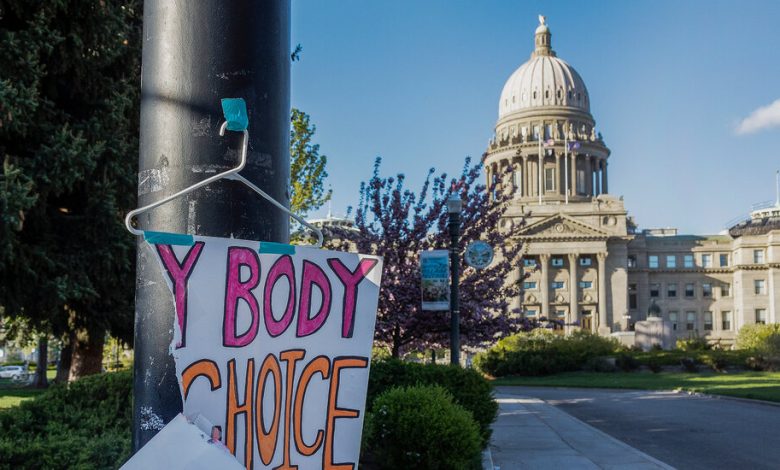Supreme Court to Hear Challenge to Idaho’s Strict Abortion Ban

The Supreme Court agreed on Friday to hear a challenge to Idaho’s near-total ban on abortions, which the Biden administration said conflicted with a federal statute that allowed for some exceptions.
In scheduling arguments for April, the court also temporarily revived the law, which had been partly blocked by a federal trial judge.
The court’s brief order gave no reasons, which is typical when the justices act on emergency applications.
The law, enacted in 2020, contained a trigger provision that kicked in 30 days after any U.S. Supreme Court decision “that restores to the states their authority to prohibit abortion.” The decision in the Dobbs case did that, and the law was set to take effect in August 2022.
The law made an exception for abortions “necessary to prevent the death of the pregnant woman” but not to address threats to a woman’s health.
The Justice Department challenged the law under a federal statute, the Emergency Medical Treatment and Labor Act, which requires hospitals that receive Medicare funding and have emergency rooms to provide treatment necessary to stabilize patients.
That federal law conflicted with and displaced Idaho’s abortion ban, the lawsuit said, because the state ban prohibited doctors from performing abortions when needed to stabilize patients.
“Even in dire situations that might qualify for the Idaho law’s limited ‘necessary to prevent the death of the pregnant woman’ affirmative defense,” the lawsuit said, “some providers could withhold care based on a well-founded fear of criminal prosecution.”
Under the state law, Solicitor General Elizabeth B. Prelogar told the justices, “an emergency-room physician who concludes that a pregnant woman needs an abortion to stabilize a condition that would otherwise threaten serious and irreversible harm may not provide the necessary care unless and until the patient’s condition deteriorates to the point where an abortion is needed to save her life.”
Judge B. Lynn Winmill of the Federal District Court in Boise entered a preliminary injunction partly blocking the state law in August 2022, saying it presented doctors with an impossible choice.
“If the physician provides the abortion, she faces indictment, arrest, pretrial detention, loss of her medical license, a trial on felony charges and at least two years in prison,” Judge Winmill wrote. “Yet if the physician does not perform the abortion, the pregnant patient faces grave risks to her health — such as severe sepsis requiring limb amputation, uncontrollable uterine hemorrhage requiring hysterectomy, kidney failure requiring lifelong dialysis, hypoxic brain injury or even death.”
“And this woman, if she lives, potentially may have to live the remainder of her life with significant disabilities and chronic medical conditions as a result of her pregnancy complication,” the judge went on. “All because Idaho law prohibited the physician from performing the abortion.”
Judge Winmill said his ruling was limited. “It’s not about the bygone constitutional right to an abortion,” he wrote. “The court is called upon to address a far more modest issue — whether Idaho’s criminal abortion statute conflicts with a small but important corner of federal legislation. It does.”
A unanimous three-judge panel of the U.S. Court of Appeals for the Ninth Circuit, in San Francisco, put Judge Winmill’s ruling on hold in September, reinstating the state’s abortion ban. The panel said that any conflict between the state and federal laws was resolved by a decision of the Idaho Supreme Court in January upholding the law but interpreting it to give doctors broader leeway in making determinations of when the procedure is required to save the woman’s life.
Last month, though, an 11-member panel of the appeals court reversed course, blocking the law while it hears an appeal. Arguments are scheduled for late January.
Idaho and state lawmakers asked the Supreme Court to step in. The federal emergency treatment law, lawyers for the state wrote, “requires only that hospitals treat indigent patients the same as they treat anyone else.”
The application added: “The only specific care the statute demands is to deliver — not abort — the child of a woman in labor, treating medical emergencies faced by ‘the unborn child’ of a pregnant woman no differently than emergencies faced by the woman herself.”
The state lawmakers, in their application, wrote of the federal law that “a statute that endorses delivery as stabilizing treatment and mentions unborn children four times is (to say the least) an unpromising candidate for a national abortion mandate.”



